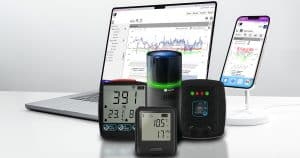The data logging and monitoring field is always improving, offering increasingly sophisticated solutions to cater to a range of demands from various businesses. One major development is the shift from USB data loggers to Wi-Fi data logger devices. This leap forward goes beyond technological advancement; it unlocks a multitude of benefits that can transform data management practices.
Real-time Data Access and Monitoring
One of the most significant advantages of Wi-Fi-enabled, cloud-connected data loggers is the ability to access and monitor recorded data in real-time. Unlike USB data loggers which require manual user intervention to download data, cloud-connected data loggers continuously transfer information recorded from the data logger to a cloud database. This feature enables users to view their data from anywhere and at any time, simply by using a web-based dashboard or mobile app. This is particularly crucial for industries where conditions change rapidly, such as environmental monitoring or perishable goods logistics. It allows for faster responses to possible difficulties, lowers the chance of data loss from uncollected readings, and enhances overall operational efficiency. By providing real-time insights, these advanced data loggers not only save valuable time but also facilitate proactive decision-making, ensuring that critical parameters are consistently within desired thresholds.
Scalability and Flexibility
Cloud-connected, Wi-Fi data loggers offer significantly more scalability compared to traditional USB data logger devices. As the scope of data-gathering needs expands, cloud-based solutions can be effortlessly scaled to accommodate an increased number of loggers. This scalability is facilitated by the cloud infrastructure’s capacity to handle large volumes of data from multiple sources without the need for substantial hardware upgrades or changes in the physical infrastructure. Adding new loggers to the network is as simple as configuring them to connect to the existing cloud system, allowing for rapid expansion that keeps pace with your business growth.
Moreover, the installation of cloud-connected loggers is markedly more flexible than that of USB data logger devices. These loggers only require access to a Wi-Fi network to transmit data, eliminating the necessity for a physical connection to a computer or other host devices. Loggers can be placed in remote or difficult-to-access areas without worrying about wiring or the proximity to computer systems. This flexibility greatly enhances the practicality of deploying data loggers in a wide range of environments, from expansive industrial sites to mobile settings, further enhancing the overall utility and effectiveness of data collection efforts.
Automated Alerts and Notifications
A pivotal benefit of Wi-Fi data loggers is their ability to provide automated alerts and notifications. These advanced systems can be configured to send instant notifications to relevant personnel when data points fall outside predefined thresholds. This immediate alerting mechanism ensures that any irregularities are swiftly detected and addressed, mitigating potential risks or damages. For example, in cold chain logistics, temperature excursions can compromise product integrity; however, receiving instant alerts allows for immediate corrective actions, preserving product quality and compliance with safety regulations. Moreover, these alerts can be received on various devices, including smartphones, tablets, and computers, ensuring that key stakeholders remain informed regardless of their location. This capability not only enhances the efficiency of monitoring processes but also significantly improves operational reliability and safety standards.

Efficient Data Analysis and Reporting
Wi-Fi data loggers revolutionize the efficiency of data analysis and reporting by leveraging the power of cloud computing. Platforms such as the EasyLog Cloud offer sophisticated tools for visualizing data through dynamic graphs and charts, enabling users to intuitively understand datasets at a glance. Furthermore, the EasyLog Cloud has powerful analysis tools that enable users to find patterns, do predictive analytics, and identify abnormalities faster and more precisely than ever before. This analytical power supports proactive management and strategic planning.
Cloud Connected Data Loggers
Environmental and Operational Compliance
For companies operating under stringent environmental or operational regulations, cloud-connected data loggers are invaluable tools for ensuring compliance. These devices automatically monitor and log data, fulfilling requirements that mandate continuous oversight of specific parameters.
The cloud allows for secure storage of vast amounts of historical data, which can be crucial during compliance audits. Auditors can access a comprehensive record of past data, neatly organized and easily retrievable, eliminating the common challenges associated with manual record keeping. This secure, centralized storage of data ensures that all information is preserved intact and unaltered, providing clear evidence of conformity to mandated standards.

Conclusion
The transition from USB data logger devices to Wi-Fi data loggers marks a significant advancement in data management technologies. The advantages of real-time monitoring, improved security, scalability, automatic alarms, and efficient data processing are strong reasons for businesses to consider upgrading. As organizations embrace digital transformation, the use of cloud-connected data loggers becomes not only a choice but a must for remaining competitive and maintaining operational excellence.
Wi-Fi Solutions from EasyLog
Our EasyLog Wi-Fi-enabled data loggers exemplify the cutting-edge capabilities of cloud-connected monitoring tools. EasyLog’s data loggers provide real-time data access and monitoring, a crucial advantage for industries that require immediate data analysis and reaction. Unlike traditional USB data loggers that necessitate manual downloads, EasyLog’s Wi-Fi data logger devices automatically sync data to the EasyLog Cloud database, allowing users to access and manage data anytime, anywhere through a web-based dashboard or mobile app. This feature not only speeds up response times to potential issues but also reduces the risk of data loss and boosts operational efficiency by ensuring that all critical parameters are consistently monitored within desired thresholds.
Furthermore, these loggers offer exceptional scalability and versatility. Because of its cloud-based design, EasyLog’s solutions may be readily scaled to meet a company’s data-collecting demands without requiring substantial infrastructure updates. The loggers require just Wi-Fi access, eliminating the limits of physical connections and allowing installation in remote or difficult-to-reach places. This adaptability makes it easier to deploy data loggers in a variety of situations, facilitating data-gathering activities across large industrial sites or mobile operations.
Our loggers enhance operational reliability and safety through automated alerts and notifications. These systems are designed to instantly notify personnel when data deviates from pre-set thresholds, allowing for rapid intervention. Such features are essential in maintaining product integrity in scenarios like cold chain logistics, where temperature variations can lead to compliance issues or safety breaches.
The sophisticated cloud software provides dynamic graphical presentations of data, trend analysis, and predictive analytics, empowering users with the tools to perform detailed data assessments quickly and accurately.
For organizations under strict environmental or operational directives, EasyLog’s Wi-Fi data loggers ensure adherence to regulatory standards by providing continuous monitoring and secure, organized storage of historical data. This robust documentation aids in simplifying compliance audits and offers clear proof of ongoing conformity to required standards, safeguarding companies against potential non-compliance repercussions. For more information check out our USB vs Wi-Fi page or Explore our range of Wi-Fi data loggers.
USB vs Wi-Fi



